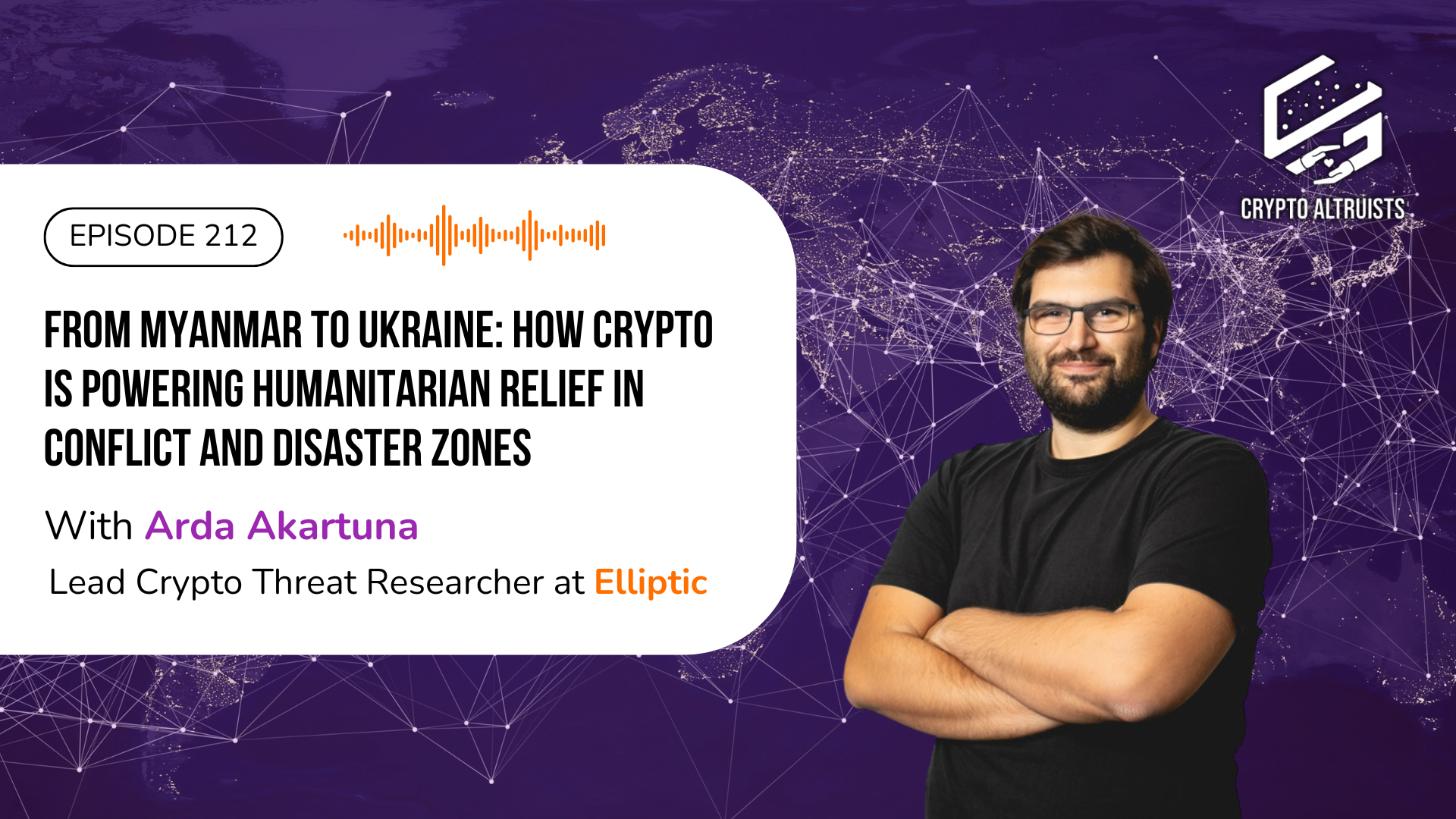
For episode 212, we welcome Arda Akartuna, Lead Crypto Threat Researcher at Elliptic, a blockchain intelligence firm trusted by over 700 institutions worldwide to track and secure digital asset activity across 50+ blockchains.
In this episode, we explore one of the most powerful and underreported use cases of crypto: getting aid to those in need when everything else fails. From war-torn Ukraine to the recent earthquake in Myanmar, crypto is enabling donations to flow directly to civilians, civil society groups, and even governments-in-exile, bypassing censorship, red tape, and authoritarian control.
We zoom in on Myanmar, where the opposition National Unity Government (NUG) used a blockchain-based wallet and its own tokenized currency to deliver nearly $2 million in aid after the March earthquake despite a military junta intent on blocking support.
Arda helps us understand how tools like Elliptic’s analytics platform help monitor and legitimize these flows, ensuring that crypto-driven aid remains secure, transparent, and impactful.
This conversation is a testament to how blockchain technology can serve as a lifeline in the world’s most urgent humanitarian and geopolitical crises, and why the future of aid is onchain.
You’ll learn:
🌐 Decentralization makes a difference: Unlike traditional finance, blockchain tools let aid flow around censorship and authoritarian control, getting resources directly to people in need, faster and more affordably, without the need for centralized institutions.
⚠️ Addressing scams, crime, and chaos: From fake donation sites to digital organized crime in lawless zones, humanitarian crypto faces serious risks, but awareness, traceability, and the right tools can help mitigate them.
🔍 Blockchain-powered transparency can rebuild trust in the humanitarian sector: With skepticism toward aid organizations at an all-time high, blockchain offers a way forward by restoring donor confidence through onchain accountability and open, verifiable impact.

PIPE gDAO is leveraging blockchain for their University Real World Asset IP Launchpad that helps bring groundbreaking ideas from lab to market. By joining the Pipe Associate Network (aka PAN), associates can create a profile highlighting their skills, be notified of opportunities, and then contribute fractional work to pre-IPO companies in return for equity and tokens.
Check out their Linktree for links to all of their socials so you can get involved and join this growing community!
02:30 - Let’s start with your journey—what first drew you to the world of blockchain, and how did that lead to your work in crypto threat intelligence at Elliptic?
04:25 - Can you please give listeners a high-level overview of the mission of Elliptic?
05:55 - You’ve studied how crypto operates in some of the most high-risk environments on Earth. Can you walk us through what’s happening in Myanmar, and how crypto is enabling aid to reach communities that would otherwise be cut off?
10:15 - The Myanmar case involves the use of a government-in-exile’s own digital currency. What does it tell us about the evolving role of crypto in geopolitics and civil resistance?
13:30 - From Ukraine to Syria and Turkey, crypto has played an increasingly visible role in humanitarian response. Why do you think crypto is becoming a go-to tool for aid delivery in crisis zones?
17:55 - What are some of the risks or challenges that come with using crypto in conflict settings, and how do tools like Elliptic’s platform help mitigate them?
24:00 - Unfortunately, there have also been many cases of bad actors leveraging crypto to commit scams and engage in criminal activity. How has the space evolved to respond to these issues and hold bad actors accountable?
29:25 - How does Elliptic trace and visualize cross-chain aid flows in regions like Myanmar, and what steps do you take to ensure this financial activity remains secure, legitimate, and impact-driven?
34:25 - Tell me more about the services and support you offer to NGOs and civil society organizations to help increase transparency and visualize donation flows?
36:00 - What’s the best way for listeners to learn more about Elliptic and yourself? Do you have a CTA for listeners?
39:30 - Zooming out a bit—how do you see the role of blockchain and crypto evolving in humanitarian settings over the next 5–10 years? Are there any innovations or regions you're especially keeping an eye on?
Please note: we make use of affiliate marketing to provide readers with referrals to relevant products and services.
Support thoughtful, independent crypto journalism and help us continue highlighting blockchain’s potential for social and environmental impact.
cryptoaltruists.eth
While we may discuss specific web3 projects or cryptocurrencies on this podcast, please do not take any of this as investment advice, and please make sure to do your own research on potential investment opportunities, or any opportunity. We host a variety of guests on this podcast with the sole purpose of highlighting the social impact use cases of this technology. That being said, Crypto Altruism does not endorse any of these projects, and we recognize that, since this is an emerging sector, some may be operating in regulatory grey areas, and as such, we cannot confirm their legality in the jurisdictions in which they operate, especially as it pertains to decentralized finance protocols. So, before getting involved with any project, it’s important that you do your own research and confirm the legality of the project. More available HERE.